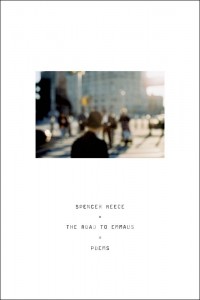25 Points: The Road to Emmaus: Poems
 |
The Road to Emmaus: Poems
by Spencer Reece
Farrar, Straus and Giroux, 2014
144 pages / $24.00 buy from Amazon
|
1. I have always had a thing for men of God.
2. Spencer Reece is an Episcopalian minister. Do not let this turn you off. If you do, you will be doing yourself a great disservice. You will be denying yourself something sight unseen.
3. The priest at my father’s funeral was a radical one. His name was Father Pat, and he was a notorious IRA sympathizer. At the service, Father Pat was treated like a rock star. At his own funeral, my father was upstaged.
4. Reece did not become a minister until he was 48 years old. It took him eleven years to write the poems in The Road to Emmaus. I find this to be strangely reassuring; I always feel like I am rushing, trying to make up for lost time.
5. In 2010, Reece served at the only all-girl orphanage in Honduras, Our Little Roses, in San Pedro Sula. San Pedro Sula is the murder capital of the world. At a reading from this book that I attended last week, Reece told a story of a friend’s attempt to raise money for the orphanage from a wealthy benefactress. The woman agreed to make the donation, saying, “How else will Honduras get its maids and prostitutes?”
6. A year after my father’s death, Father Pat was arrested for laundering money for weapons to the IRA.
7. The Road to Emmaus refers to a story in the Gospel of Luke where Jesus makes an appearance to two of his disciples as they leave Jerusalem for the city of Emmaus, two days after Jesus’ crucifixion. The two disciples are leaving Jerusalem, perhaps for good, because of the events surrounding Jesus’ death. A man appears to the disciples on the road; he does not identify himself, and the disciples don’t recognize him. Instead, as he walks with them, the man corrects their misinterpretations about what has transpired; telling them it was all in line with God’s plan. Still not recognizing the man as Jesus, the disciples invite him to eat with them. Later, when they finally recognize him as Jesus, he disappears.
8. Reece describes himself as coming to religion “tentatively.” He told the Poetry Society of America that he feels a connection to T.S Eliot, who was also devout. Like Eliot, many of Reece’s poems mix verse with prose. “When I try to write, his example is never far from my mind. At times, I’d like to think I am in conversation with him,” Reece has said.
9. I have dreamed in lyrics from “Me and Julio Down by the School Yard.” And when the radical priest comes to get me released...I blame the Berrigan Brothers.
10. The story of Reece’s road to publication is oft-repeated. He wrote for over two decades, mostly alone, sometimes while living in farm house/ bird sanctuary in Minnesota, publishing only a handful of poems over that time. He sent out the manuscript for his first book of poetry, The Clerk’s Tale, to over 250 first- book contests without success. In 2003, he won the Bakeless Poetry Prize, judged that year by Poet Laureate Louise Glück. The title poem from The Clerk’s Tale was made into a short film by James Franco while Franco was a student at NYU. The poem is a story of the day in the life of Reece, and an older gay co-worker, as they go about their work day at a Brooks Brothers in the Mall of America.
September 23rd, 2014 / 1:56 pm
